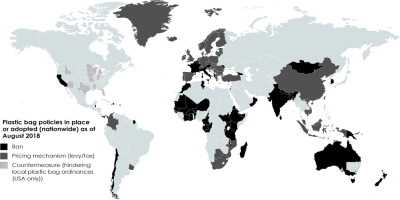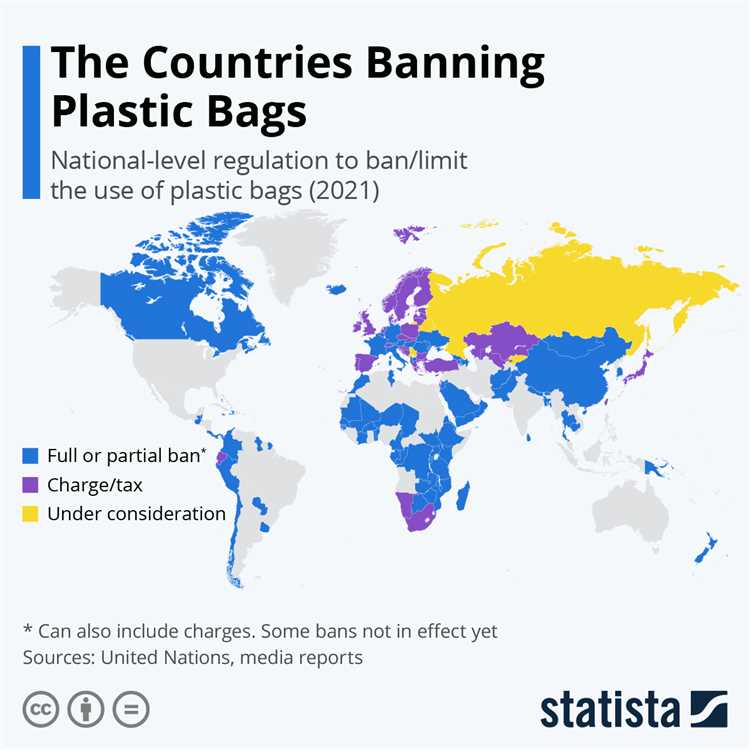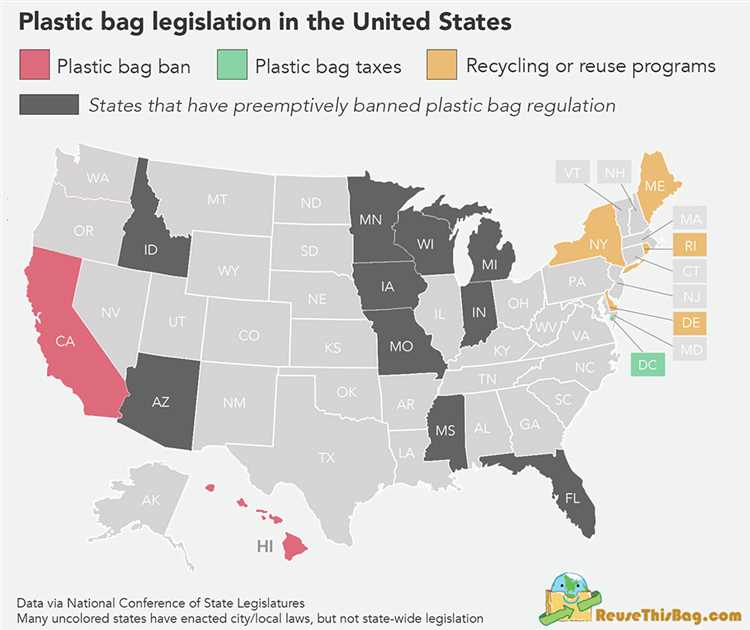Plastic bags have become a major environmental concern in recent years due to their negative impact on ecosystems and their role in contributing to the global plastic pollution crisis. In response to this issue, many countries around the world have implemented plastic bag taxes as a means to reduce their usage and encourage the adoption of more sustainable alternatives.
Plastic bag taxes, also known as single-use plastic bag levies, are a type of environmental tax imposed on the production, distribution, or use of plastic bags. The purpose of these taxes is to discourage the consumption of plastic bags by making them more expensive or inconvenient for consumers, while also generating revenue that can be invested in environmental initiatives.
The regulations surrounding plastic bag taxes vary from country to country. Some nations have implemented outright bans on single-use plastic bags, while others have imposed taxes of varying amounts depending on the size and type of bag. In some cases, the taxes apply to both retailers and consumers, while in others, only retailers are responsible for paying the tax.
Despite the differences in approach, the overall impact of plastic bag taxes has been promising. Numerous studies have shown significant reductions in plastic bag usage in countries where these taxes have been implemented. This has led to a decrease in plastic waste, a reduction in marine pollution, and an increase in the use of reusable bags.
As the issue of plastic pollution continues to gain global attention, the implementation of plastic bag taxes has become a widely accepted and effective strategy for combating this environmental problem. With more countries adopting these regulations, there is hope that the excessive use of plastic bags can be curbed, leading to a cleaner and more sustainable future for our planet.
- Environmental Impact of Plastic Bags
- Plastic Bag Tax Implementation
- Plastic Bag Tax Rates
- Effectiveness of Plastic Bag Taxes
- Reduction in Plastic Bag Consumption
- Waste Reduction and Environmental Benefits
- FAQ:
- Why are plastic bag taxes implemented worldwide?
- Are plastic bag taxes effective in reducing plastic bag usage?
- Do all countries have plastic bag taxes?
- What are some alternatives to plastic bags?
Environmental Impact of Plastic Bags
Plastic bags have significant negative impacts on the environment. Due to their lightweight nature, they can easily be carried by wind and water currents, ending up in rivers, lakes, oceans, and other water bodies. This causes pollution and poses a threat to marine life.
Marine animals such as turtles, seabirds, and marine mammals often mistake plastic bags for food. When ingested, these bags can block their digestive systems, leading to starvation, suffocation, and death. Additionally, plastic bags can entangle marine animals, causing them to drown or suffer severe injuries.
Plastic bags are not easily biodegradable and can take hundreds of years to break down. As a result, they accumulate in landfills, contributing to the increasing problem of waste management. Furthermore, when plastic bags degrade, they release toxic chemicals into the soil and water, further polluting the environment.
The production of plastic bags also has a negative impact on the environment. It requires significant amounts of fossil fuels and energy, contributing to greenhouse gas emissions and climate change. Additionally, the extraction of the raw materials used to make plastic bags, such as petroleum and natural gas, can lead to habitat destruction, deforestation, and air and water pollution.
The environmental impact of plastic bags has led many countries and regions to implement regulations and initiatives to reduce their use. These include taxes, bans, and recycling programs aimed at promoting the use of reusable bags and reducing plastic waste. By acknowledging the environmental consequences of plastic bags, we can take steps to minimize their ecological footprint and protect our planet for future generations.
Plastic Bag Tax Implementation
The implementation of plastic bag taxes varies across countries and regions worldwide, reflecting different approaches and regulations. In many cases, the goal of implementing a plastic bag tax is to reduce plastic waste and encourage the use of reusable bags.
Legislation and Regulation:
Plastic bag taxes are typically introduced through legislation or regulatory measures. Governments identify the need for reducing plastic bag consumption and implement taxes as a means to achieve this goal. The specific details of the legislation, such as the tax rate, exemptions, and collection methods, may vary depending on the country or region.
Tax Rates:
The tax rates for plastic bags also vary. In some cases, taxes are fixed at a specific amount per bag, while in others, the tax is based on the type or size of the bag. Higher tax rates are often imposed on single-use bags, such as thin, lightweight plastic bags, while lower or no taxes may be applied to thicker, more durable bags that can be reused.
Exemptions:
Some countries and regions have exemptions or limitations on the plastic bag tax. For instance, certain types of bags, such as those used for loose produce or medications, may be exempt from the tax. Additionally, businesses of a certain size or in certain sectors may be exempt or subject to different tax regulations.
Collection and Use of Tax Revenue:
The revenue collected from plastic bag taxes can be used for various purposes. Some governments allocate the funds towards environmental initiatives, such as recycling programs or promoting public awareness of the environmental impacts of plastic bags. Others may use the revenue for general government expenses or invest in sustainability projects.
Impact and Effectiveness:
The effectiveness of plastic bag taxes in reducing plastic waste varies. Some countries and regions have seen significant declines in plastic bag consumption following the implementation of taxes, while others have experienced more modest results. The success of the tax often depends on factors such as public awareness, enforcement, and the availability of alternative bag options.
Public Opinion and Behavior Change:
The implementation of plastic bag taxes can also contribute to a change in consumer behavior and public opinion. By imposing a tax, governments aim to raise awareness about the environmental consequences of plastic bag usage and encourage individuals to switch to reusable bags. Over time, this can lead to a broader shift in societal attitudes towards plastic waste and sustainability.
In conclusion, the implementation of plastic bag taxes is a complex and diverse process. While the specific regulations and outcomes may differ, the overarching goal is to reduce plastic bag consumption and promote more sustainable alternatives. With continued efforts, plastic bag taxes can play a significant role in the global fight against plastic pollution.
Plastic Bag Tax Rates

Plastic bag taxes vary widely around the world, reflecting different approaches and policy priorities. Here is an overview of some of the plastic bag tax rates in different countries:
1. United Kingdom: In the UK, the plastic bag tax rate is currently set at £0.10 per bag. This tax was introduced in 2015 and has been successful in reducing plastic bag usage.
2. Ireland: Ireland was one of the first countries to introduce a plastic bag tax back in 2002. The current tax rate is €0.22 per bag, and it has led to a significant decrease in plastic bag consumption.
3. Australia: The plastic bag tax in Australia varies by state. In some states, such as South Australia and Western Australia, the tax rate is AUD 0.10 per bag. Other states have implemented bans on plastic bags altogether.
4. France: France introduced a plastic bag tax in 2016, with a current tax rate of €0.10 per bag. This tax applies to both plastic and paper bags and has contributed to a decrease in plastic bag usage.
5. China: In China, the plastic bag tax rate varies by region. For example, in Beijing, the tax rate is CNY 0.1 per bag, while in Shanghai, it is CNY 0.2 per bag. This tax has been effective in reducing plastic bag consumption in these cities.
These are just a few examples of the plastic bag tax rates implemented worldwide. Many other countries and regions have also implemented similar measures to reduce plastic bag usage and encourage more sustainable alternatives.
Effectiveness of Plastic Bag Taxes

The implementation of plastic bag taxes has been widely adopted by countries around the world as a measure to reduce plastic waste and encourage consumers to use reusable bags. The effectiveness of these taxes can be assessed in several ways, including their impact on plastic bag consumption, waste reduction, and environmental benefits.
Reduction in Plastic Bag Consumption

One of the primary goals of plastic bag taxes is to reduce the overall consumption of single-use plastic bags. Various studies have demonstrated the positive impact of these taxes on consumer behavior. For example, in Ireland, the introduction of a plastic bag tax in 2002 resulted in a dramatic decrease in plastic bag usage by 90%. Similar outcomes were observed in other countries such as Denmark, Wales, and Scotland.
Furthermore, the implementation of plastic bag taxes also encourages consumers to switch to alternative options such as reusable bags or biodegradable bags. This behavioral shift contributes to a significant reduction in plastic bag demand, thereby mitigating the environmental impacts associated with their production and disposal.
Waste Reduction and Environmental Benefits
Plastic bag taxes have proven to be effective in reducing plastic bag waste and its impact on the environment. By discouraging the use of single-use plastic bags, these taxes minimize the amount of plastic waste generated, leading to a decrease in landfill space required for disposal.
Moreover, plastic bag taxes often serve as a catalyst for broader changes in consumer behavior towards more sustainable practices. The introduction of these taxes prompts individuals to rethink their consumption patterns and adopt eco-friendly alternatives. This shift towards reusable bags not only reduces the quantity of plastic waste but also conserves natural resources and decreases the carbon emissions associated with the production of plastic bags.
In addition to waste reduction, plastic bag taxes have also been effective in mitigating the negative impact of plastic bags on marine ecosystems. By reducing the number of plastic bags reaching water bodies, these taxes help protect marine life from the harmful effects of plastic pollution, including entanglement and ingestion.
Overall, the implementation of plastic bag taxes has proven to be an effective strategy in reducing plastic bag consumption, waste generation, and environmental harm. While the specific results may vary by country, the adoption of these taxes signifies a global commitment to tackling the issue of plastic pollution and moving towards a more sustainable future.
FAQ:
Why are plastic bag taxes implemented worldwide?
Plastic bag taxes are implemented worldwide to reduce the use of single-use plastic bags and promote more sustainable alternatives. This helps to minimize the negative environmental impact of plastic bags, such as littering and pollution.
Are plastic bag taxes effective in reducing plastic bag usage?
Yes, plastic bag taxes have been proven to be effective in reducing plastic bag usage. In countries where these taxes have been implemented, there has been a significant decrease in the consumption of plastic bags and a shift towards using reusable bags.
Do all countries have plastic bag taxes?
No, not all countries have plastic bag taxes. The implementation of such taxes varies from country to country, with some having strict regulations and others not having any regulations at all.
What are some alternatives to plastic bags?
There are several alternatives to plastic bags, including reusable cloth bags, paper bags, and biodegradable bags made from materials such as cornstarch. These alternatives are more environmentally friendly as they can be reused or easily decomposed.